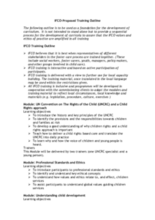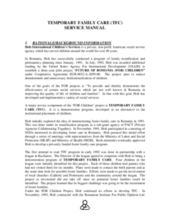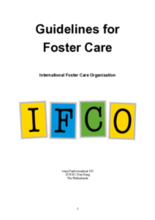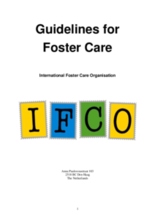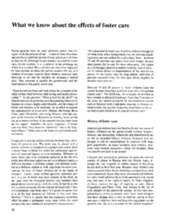Displaying 2201 - 2210 of 2221
A training outline that conveys IFCO values and ethics of practice in foster care services. It provides 13 modules dealing with issues such as the rights of the child, child development, state care, foster care, transition from care, and legal and administrative management of child protection services.
A manual for the establishment of foster care in Romania as an alternative to the institutional placement of children. Addresses the legal framework, policies, processes, responsibilities and administration surrounding creating and maintaining a foster care system.
Guidelines for foster care, developed by IFCO at a special Working Group Meeting held in Bangkok, Thailand from 1-4 May 1995 in cooperation with the Department of Public Welfare, Bangkok.
Procedural standards outlining the roles and responsibilities of fsoter care authorities and agencies.
This article, published in the book ‘Assessing the Long-Term Effects of Foster Care: A Research Synthesis,’ provides an overview of the history of the foster care system in the United States and findings from multiple studies on the effects of foster care on children.
As part of phase one of the development of the Martin James Foundation's Asia Care Network, comprehensive studies of the care system in each country were conducted to highlight the need for developing alternative care systems across South-East Asia. This case study highlights relevant data from Hong Kong.
This study offers ideas that would guarantee the safety of children within the informal foster care net in Nigeria. The authors investigated informal foster care practice in two local government areas of Anambra State, Nigeria using Key Informant Interviews (KIIs).
This page from the Human Rights Campaign provides a list of resources for child welfare professionals working with LGBTQ youth and families.
As part of phase one of the development of the Martin James Foundation's Asia Care Network, comprehensive studies of the care system in each country were conducted to highlight the need for developing alternative care systems across South-East Asia. This case study highlights relevant data from Vietnam.
Esta página de Doncel presenta una panorama general de la "Ley de Egreso" que establece nuevos derechos para jóvenes sin cuidados parentales en Argentina.

